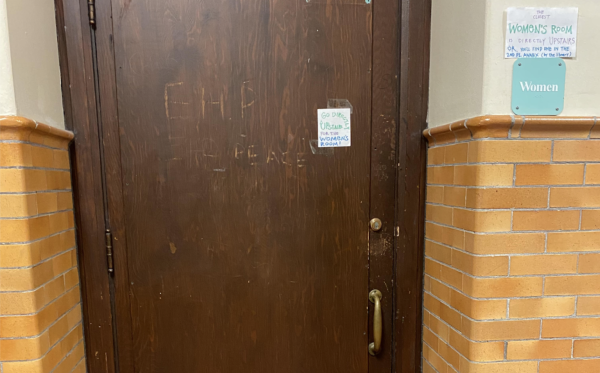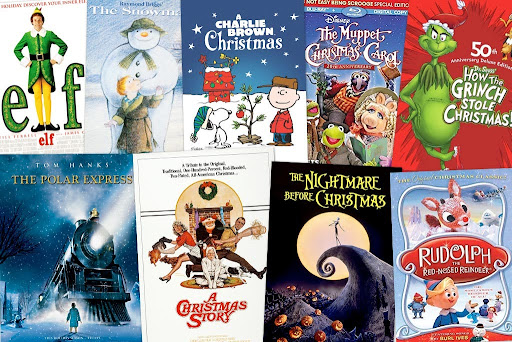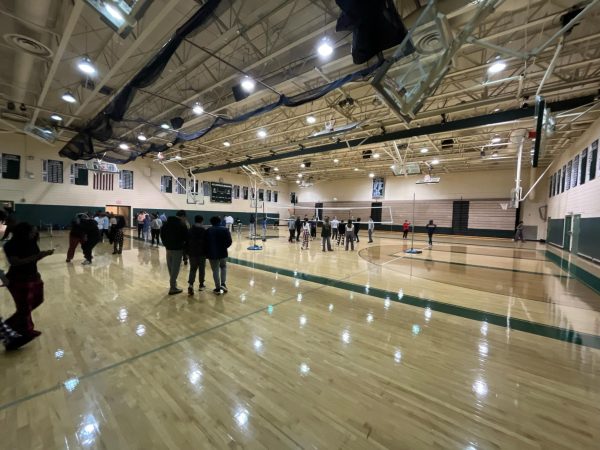Amanda Gorman Took the Nation — and English Classes — by Storm

Bienkowski observed, “She walked there as though what was so much more important — and it is so much more important — is saying what she had to say: the message. I think people’s fear of public speaking can come from a place of ego, like they want to look good and sound good, and she just seemed to present herself prioritizing her message over everything else.”
Prior to January 20th, if you had asked me to associate a poem with the incoming Biden administration, I would have said, “the one where hope and history rhyme,” referring to Seamus Heaney’s moving poem “The Cure at Troy.” President Biden often used the piece on the campaign trail, finding meaning and inspiration in its words of healing. Still, I don’t think I really felt hope and history rhyme until a different poet took the stage at Biden’s inauguration.
With her hands flitting about the podium like doves, her voice steady and youthful, and words that pierced to the core of the American paradox, Amanda Gorman took the nation by storm. I watched her recite — no, perform — her poem, “The Hill We Climb,” and for the first time felt like there was really a chance that our country could be okay.
The following Monday was the first day of the second semester, and my asynchronous assignment for English class was all about Gorman’s poetry. We had to watch and respond to questions about her TED Talk, inauguration performance, and her reading her poem, “The Miracle of Morning.” It made perfect sense to me that this would be our assignment — poetry taking up the national spotlight must be every English teacher’s dream.
I was right: at least fourteen out of the sixteen teachers in the Allderdice English department used Gorman’s poetry in their classes in some form or another. So what made Gorman’s art, especially that inauguration poem, so enticing to English teachers? Ms. Katherine Bienkowski (my teacher!) summed it up:
It felt sort of miraculous and exciting. It’s such a moment for so many people who have waited so long for there to be something different in front of us and to have a little bit of hope. Then to have poetry celebrated — and poetry written by someone who is so young and mature, like the utter opposite of the people who have been in charge for so long. And the poem itself was so accessible in terms of the imagery and language, and it felt so hopeful. I feel like so many people connected to it but especially English teachers were like, This is what we’ve been talking about! Poetry is so relevant, and I sort of felt chills just thinking about what that poem represented for so many people.
Bienkowski recalled Obama’s inauguration in 2009 when Elizabeth Alexander recited “Praise Song for the Day.” She used that in a lesson plan too, but found Gorman’s poem to be more engaging in the classroom. “The language is so clear,” she said, “and the prosody — the poetic sound of it — is so accessible to so many people.”
Ms. Jennifer Mazzocco agrees that this piece stands out within the long history of inaugural poems. “I think they can often have an overly hopeful tone to them … but I think that her poem was also like, ‘Yeah, we’re not in good shape. There’s things that need to change and there’s ways we need to look at what it means to be an American.’”
Gorman certainly didn’t candy-coat the reality of our country’s perilous situation, and because of that realism, her message of cautious optimism felt truly authentic. Without explicitly mentioning policy details or bitter political divides, she brought clarity to the dreary consciousness of a country in torment. Ms. Amy Galloway Barr reflected, “I think right now our country is really trying to heal from some serious, serious traumas that are coming from all over the place, and I think we all collectively needed her to speak those words over us so that we could come out on the other side.”
Galloway Barr loves teaching poetry, especially to teens who are “so full of angsty teenage trauma and drama.” She describes the experience of interacting with poetry as having a before and after; you aren’t the same person after you’ve read it. “Whoever you are, in the moment when you’re sort of ingesting a poem, it comes out on the other side. Like the poem passes through you, and who you are leaves an indelible mark on that poem.”
Gorman’s poem passed through our country at a pivotal time, and students recognized its significance. Jadyn Gibson, a senior in Bienkowski’s African American Literature class, said, ‘I felt as though seeing a black youth at the inauguration after these four years; in and of itself was very symbolic and representative of [people of color] and women. It felt as though a curse has been lifted and we can finally just turn off the static of what the politics were preaching.”
Part of Gibson’s assignment, slightly different than mine in English 4, was to watch and respond to Gorman’s 2017 The Moth story, “Roar,” in which she recounts her experience auditioning for the part of Nala in The Lion King on Broadway. Gibson wrote, “she mentions that if that hadn’t failed she wouldn’t be where she is, she wouldn’t have this voice now, she would have the power that she has obtained.” In reflecting on Gorman’s impact on her, she said simply, “I could go on and on about how inspirational she is to me.”
Other students appreciated the assignments they completed about Gorman. Senior Jordan Gluzman, also a student in Bienkowski’s English 4 class, noted, “I like when teachers bring real life topics into the classroom. I also liked having the opportunity to reread and break down the poem, which allowed me to discover more things I enjoyed or found interesting about it.”
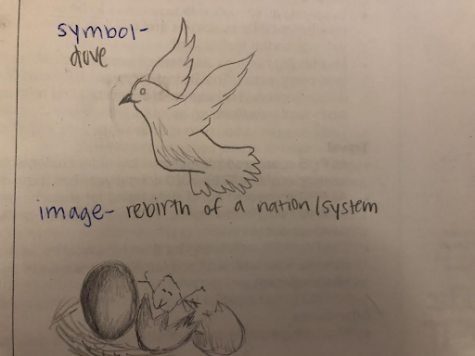
Gibson and Gluzman both noted that their love for Gorman’s poetry is an anomaly as they don’t usually engage with lengthy poems; 9th grader Oliver Hsu agrees. “I have nothing against poetry, I just find it kind of boring, but Amanda Gorman is absolutely an exception for me.” In regards to the inauguration poem, he explained, “The language and rhyming and flow and everything like that was very captivating, and once I started reading I couldn’t stop until I reached the end.”
Hsu is in one of Mazzocco’s English 1 classes; both Mazzoco and Galloway Barr had their students write their own poems. Mazzocco’s students wrote occasional poems to commemorate an event, and Galloway Barr, in honor of Gorman’s “Miracle of Morning,” directed her kids to write an “ode to an everyday hero in their life.”
They received dozens of responses that run the gamut from quirky to profound. Hsu, for example, wrote about the compost at his home, while Randall Quinn, another student of Mazzocco, wrote about his annual visits to Colorado. Quinn says that by studying Gorman’s poetry and writing his own, he “was able to learn about how powerful words can be.”
Two of Galloway Barr’s students are Siming Tang and Deniz Finkel. For his ode poem, Tang wrote about an old Magnolia tree in his yard. “Gorman’s poetry about the eventfulness of last year inspired me to write a poem about a fast moving world, and then put it in contrast with the stillness and never-changing aspect of the tree,” he said.
Finkel, on the other hand, chose to write about a person: his mailman. “He always arrives at the same time every day — around 11 am,” he said, “and always greets us with a great big smile. But because of the pandemic and online schooling, for the first time, I saw him every day, and got to appreciate how difficult his job really is.” Finkel showed his mom the poem he wrote, and she printed it out to share it with the mailman. “He said it was one of the most meaningful ‘thank yous’ he had ever received, and that he had not considered himself an essential worker compared to a nurse or a policeman.” Finkel credits Galloway Barr with providing a creative way for him to interact with Gorman’s poetry, one that allowed him to do something nice for someone else.
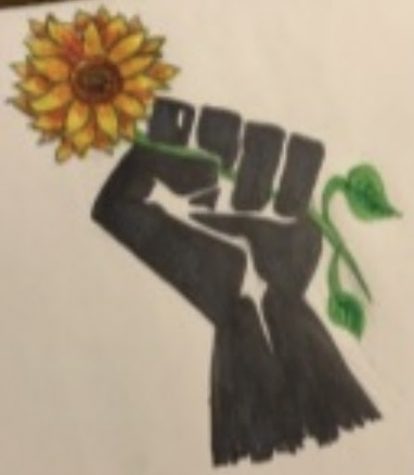
For me, poetry is not quite what jumps to mind when I think of how to improve someone’s life, let alone convince someone of a cause I’m passionate about. Mazzocco, however, points out that poetry “can be valuable for some people to give them a broader perspective or even change their perspective; I think sometimes people who wouldn’t necessarily be moved by an argument could be moved by a poem or a song or something that creates a different reaction.”
Bienkowski echoes this idea; “It has so much to offer because it can be such a speaking from the heart in language that suits you instead of trying to fit into the conventions of an essay or dialogue conventions of a short story. … Just like music. There’s something so innate about the power of music, like hearing the rhythm with the sounds and the melodies.”
Galloway Barr went as far as to imply that poetry is absolutely vital to our lives. When I asked her what the value of it is, she responded immediately, “That’s like saying ‘why do we take deep breaths when we need to breathe?’” Gorman allowed the nation the space to take a deep breath when we desperately needed it.
Gorman aspires to be more than the inaugural poet; she has said many times that winning the presidency herself is in her sights. Finkel believes she’ll be “the president of my generation,” and she’s well on her way to becoming a well-rounded national figure. Since the inauguration, Gorman has signed a contract with IMG Models, recited a poem at the Super Bowl, and spoke out about a traumatic experience she had with a racist security guard.
These might seem disparate, but the common thread through all of them is teaching. “Her mom is a teacher,” Galloway Barr said, “so to me, as a parent and a teacher, I was looking at her [during the inauguration] with that pride, like ‘Oh, look at you! And I know how your mom feels in this moment!’ And my mom is a teacher, and I felt like there’s this connectedness that we feel, because what she’s doing is teaching. She’s doing it in a different way, but that’s education.”
Fifteen of Mazzocco and Galloway Barr’s students have generously shared the poems they turned in for their Amanda Gorman-inspired assignments. They are published below, starting with the students mentioned in this article, followed by the rest in alphabetical order by student last name.
Ode to the Mailman
Deniz Finkel
Mr. Mailman
Predictable as the sun rise
You always come to our street with such a warm smile
You walk across our lawn
In snow, rain and sleet
To ring the bell to let us know
There is a letter or package with our names on it
One of us rushes to the door to say ‘thank you’
Sometimes you are already gone, disappeared behind the bushes
But you still manage to turn around and we hear your voice cut through the houses
“You’re welcome” your warm smile travels with your voice
Strangest times these are
We are always home, and you always arrive
You bring the world to us
As we lock into the safety of our homes
Our dog always greets you with a joyful bark to show its gratitude
It took a pandemic not to take you for granted
How essential your daily route is
How your dedication keeps our sanity
So, we offer our own package of gratitude
Thank you
Underneath the Earth
Oliver Hsu
Down in the dark and the damp
Cramped between the dryer and the single hanging lamp
The bins that hold the worms lie side by side
And every single worm inside is blind
It had been a while since I had gone to feed the worms
The cool air eased my mind and soothed my concerns
The dim light was calm and the stone walls were comfy
I lay out the compost (it was rather lumpy)
I opened the lid of the worm bin to see
If the worms were awake, if they’d come to eat
I placed all the compost atop the moist soil
And waited and watched as the worms writhed and roiled
They rose to the surface to eat the new food
Then sunk slowly back into the dirt that they used
They travelled quite aimlessly through their enclosure
I watched them and waited for the feast to be over
The wet newspaper strips which kept their soil soft
Were across the top layer, splayed out and dissolved
And as I stood laying them out in their rows
I felt strangely calm, like a slow-rising dough
A sense of peace came just from watching them burrow
They’ll live here for decades, mere meters below
They might do things without us, living lives of their own
And I’d never know
Untitled
Quinn Randall
Every June my family goes to Telluride Colorado.
It’s one of my favorite places in the world.
The plane rides were always the worst, but it was always worth it when I got to see my
grandmother’s soft smile and big laugh.
Living at my grandmother’s house for that short week was like living in paradise.
I would go out onto my grandmother’s balcony and see the amazing scenery.
The giant mountains, bigger than any building in Pittsburgh.
And river that flows from the mountain like a silver snake weaving throughout the town is truly
mesmerizing.
The bluegrass festival that happens around the same time we go and stay fills the whole
town with loud music.
We would often go down to the festival to enjoy the music and it was always fun to see the
people dancing as I eat my drippy vanilla ice cream cone.
My grandmother often took me and my older sister out into the town to explore.
When we got tired, we would come back and my grandmother’s house and enjoy the hot tub
she has in her backyard.
The river water moved extremely fast like an avalanche or a stampede coming down from the
mountains.
I once lost a shoe in the river when I was little.
I would cry and cry, I knew I would never get it back.
But my kind grandmother told me that it would be okay, and I have nothing to be sad about.
As we drive away from the town, I can’t help but miss the place.
I knew that in just one year that I would be back to see my grandmother and the beautiful
place she lives.
Magnolia
Siming Tang
A silhouette stands static
Against a backdrop of blurring change,
Falling petals Illuminating the dark world that I no longer recognize.
Through blizzards, branches may sway,
But I may rest underneath them with confidence that the roots underneath me stay fixed.
Oh Magnolia, whose blossoming arms herald the arrival of warmth,
You remind me that after every winter, there is a spring.
The Man at the Market
Anonymous
He sees the roses
Atop the bundle of thorns
He fills a room with smiles and laughter
And the garden in his mind blooms
He meets droves of people at the market
Directing them to keep everyone safe
Sowing the seeds of their gardens
Connecting with them for a brief moment,
Despite the barriers between them
He is dedicated to his work
Often singled out for tasks
Because it will be completed and done well
He is well-respected
But dissatisfied
And his garden often goes days without sunlight
Caught in a cycle of looking at the same clouds every day
He comes home to his family
Excitedly greeting them
Showing new products from the market
Sometimes bringing new sweets home
He hugs them tightly
Knowing that they are the most important thing
In the world to him
And then settles down for dinner
Often eating right out of the serving dishes
His eyes soon fluttering
Between rest and consciousness
Somewhat resentful of his drained energy
Eventually he goes up to his room
Tired
But struggles to fall asleep
Trying to quell the discomfort
And the schedule continues
He worries about the future
He knows deep sadness
Sometimes it is hard for him to see what is right in front of him
But he strives to see the world in its vibrancy,
In all its intricacies,
And spread this vision to those around him
Untitled
Anonymous
My mom is an everyday hero
As a nurse in a hospital saving lives
Helping people that others hold dear
From ages of eighty to kids age of five
Not afraid, saving people in this time of fear
My mom is an everyday hero
As a mom in the house helping with homework
Or cleaning up a mess while maintaining a smirk
She is a hero and is always there
Being a hero with lots of care
As Time Passes
Marcel Craig
Waking up has never been harder
Yet I do so for reason that are slowly becoming less and less clear
I get up just to sit back down.
I get up just to look at a screen
I get up just to complete work that has little meaning
I get up just to lay back down
Repeating the cycle over and over again
I think to myself how and why did this happen
How and why the unseen hand that has grasped the world
Tightening its grip slowly but surely crushing till insanity
But what is insanity?
Doing something over and over with little to no result
Am I insane?
Insane for getting up just to sit back down
Insane for getting up just to look at a screen
Insane for completing work that holds little meaning
Insane for doing all that just to repeat it again and again and again
Day in and day out
As I wait for the invisible hand to crush me under its sickening fury
But I wait
Waiting for the hand that one’s grasped this world to loosen its grip
Waiting for the time my wings are spread and ready for flight
Waiting for people to crumble their pride as we crumble the unseen hand
And when it is done
When we are finally free from the hand
The hand that has claimed many, many lives
Then will I be insane
Then will the days of isolation be worth it
Then will the question is it more important to live or survive become clear
Then.
I will walk free from the hands that one’s held me down
Wings free from the grasp of the unseen hands.
America the Burning
Sophia Dull
We’re burning, aren’t we?
I asked my parents,
As the banners of a coward
Pierced the capital.
We burn as…
The lies of someone
Whom we depended on
Tried to bring our country to ruin.
We burn as…
Our planet suffers,
The ice melts,
And the tear the west limb from limb.
We burn as…
A virus,
Ransacks our lands,
And slaughters thousands.
And we burn…
As our own people,
Turn against each other,
In a war that never should have begun.
O beautiful.
For smoky skies and poisoned waves of grain.
For melting mountain majesties above the warlike plain.
America. America.
We fight in our own streets.
To throw away our brotherhood,
Into the rising sea.
Untitled
Roman Griffin
Up bright and early, air pods in my ear bumping youngboy
Sun Justs popping up in the sky, it looks like a mixture of red, orange, and yellow
mc griddle sandwich is fire, but the mc Donald’s orange juice is nasty
Look outside see crows in the air, trees bright and green
Cars all beside me, white lady on the phone driving next to me
Two deer’s and a cub on the side of road, eating the wet grass
Look straight and see a long road, with no ending
Heat was barley blasting, blanket on me, freezing
Old head music bumping in the background of my music,
wondering when pops gone turn that shit down, phone frequently going off,
but I just felt like sleeping, Outside looks like a work of art but from nature,
Pennsylvania’s hills, sights you don’t get back at home
At this point in this poem, I don’t have much to say,
there shouldn’t be a specific way to end, my poem
Hope you enjoyed these 15 lines, of art
My First Nail
Lynda Johnson
I felt like a kid in a candy shop, eager to
touch everything in the store. I knew I could achieve my goal with
positive thinking. I’ve worked so hard.
Saved every penny
Just to buy everything I needed, to do my first nail.
Sitting on my back porch, listening to music.
I put in my headphones so there were no distractions.
The first couple times it was a little messy.
And I am not going to lie, I did get discouraged.
But I watched some videos.
And figured it out.
I was finished with my first nail!
Finally Free
Aya Koide
I go to sleep Saturday.
Thinking of an excuse not to go
Trying to remember what I learned last week.
But the knowledge in my head is slipping away.
My heart races just thinking about going.
I let the tears run down my face into my pillow.
I try to remember the better parts.
I try to remember the reason I go.
I try to remember the people who keep me going.
I try to go to sleep
But my body seems to refuse to rest.
I hate Japanese school.
The stress that fills up on a Sunday is incomparable.
It feels like a huge boulder balancing on my shoulder.
I need it to be lifted.
I need it to be crushed.
There’s nothing there I enjoy anymore.
I wake up and the first tear falls down my face.
Followed by what feels like a thousand more.
My heart beats in my head
“I don’t want to go!”
My parents have heard me complain for centuries
They give in and no longer force me to go.
I never show up again.
I never have to go again.
I never have to wake up at 9:15 on any Sundays.
I never have to drive an hour out again.
I never have to force a smile on my face.
I never have to take those stupid tests.
The boulder on my shoulder’s shatters.
Golden Time
Aryan Mishra
A feeling that was not obliterated
But prisoned in the limitless blanket of memories
A feeling that was not my past
But my emerging future
When I gaze at the blurred window of my memory
I see myself walking with an old and tall man
Talking with a distinct voice
Knocking on a mysterious door
I recognize the setting without any lies
I still see the faces in front of my eyes
The man was my grandpa!
We were taking a trip throughout the town
Meeting different people and exploring aboveground
The time was gold
And the love was crystal clear
My mind was like an unsolved puzzle of nostalgia memories
I turned my page to a discrete past
Which was closer to my soul than I supposed
accommodated more than I proposed
I saw the incident like an episode displayed in the matrix of my mind
It was the fall of 2018
We were going abroad
I saw the planes
I saw the seas
For the second time in my life
To finally arrive at home
The clouds were racing
And the winds were breathing
After traveling numerous locations
We had already reached our destination
I recognized the faces
But one face didn’t recognize mine
Because of the nature of time
But when he did
It was the happiest moment of his life
I saw that in his joyful smile
I saw that in his eyes brimmed with tears
He was exhausted sitting in the same seat
Tired of struggling each day
I was a rising hope to his descending life
As time passed by
I helped him each day and night
Did everything in my power to reduce his struggle
And increase his happiness
But for what?
For the blessings
For the joy
Months passed by
And I felt like the richest person in the world
Carrying the blessings and hope
Beyond the scope
Time flew
To the point
It became the last time I saw that face
The journey was over
The time was gold
When Times Were Simpler
Jenna Morabito
The year is 2020.
It is only July.
After everything going on in the world the only thing I want is my yearly get away,
the time to spend with my family.
When times were simpler.
To not think about anything but the sound of the waves as they crash onto the ocean floor.
To exit the educational mindset everyone has eagerly envied during the school year,
To leave all my worries in Pittsburgh and only worry about whether the restaurant I go to will
be open or not.
To not worry about people judging me, but to worry about if I remembered to bring my mask
with me.
The time where I finally feel free to do what I want, but with restriction.
Instead of being able to walk on the boardwalk freely, I now worry if someone coughs on me
as I wait in line to get my ice cream.
When times were simpler.
When I sat at Rosenfeld’s eating my French toast, now I stand at Rosenfeld’s waiting for my
take- out.
When I got to see people’s emotion on their face, now I see a mask and sunglasses.
When times were simpler.
I got to walk in a store and hear someone tell a person “you are hired”, now I walk in a store
and they tell me “masks are required.”
When times were simpler.
I got to walk on the beach and see light, now its “no Jenna, there are too many people out tonight.”
When times were simpler.
I got to have my summer fun, now when I go to ocean city it feels like little to none.
A Caring Father
Brittany Organista
A father that wakes up earlier, then the sun
A father that comes home, saying ‘‘goodnight’’.
One day he was very sick, the parents had left in the night to go to a hospital.
Only the mother comes back.
Days go by that felt like ages, waiting to find out if the father had the vicious virus.
Tears run down the children’s face as they hear the words “he is positive’’.
It was one of the child’s birthday.
The father barely able to see his child through the small device
The child sees he has tubs everywhere on him
It was difficult for the child to witness; the child goes into a bathroom.
Crying her father will come home soon.
The mother calls for her daughter; she tries to brush the tears away.
“Are you okay” the mother says as the child starts to cry again.
The child explains that she felt guilty for not talking to her father out of fear.
The father then comforts his daughter.
A month passed by; it was the day the father comes back home.
The children come running down the stairs, as the father walks in.
They all hug him like they never had.
Hockey on Snow Days
Jacob Sindler
It was a tradition I made up, Hockey at home on snow days
I would wake up to see the snow falling, excited as can be
Running downstairs to get something to eat, while also getting snow gear ready
I grabbed my hockey stick from the bin, set up the nets
It was time to have fun, and it starts now
The trees were covered in clumps of snow, feeling as it were a winter wonderland
The driveway was covered in ice, I could barely move around
We would start playing, and we start to glide on the ice
Keeping our balance as we can, before falling and laughing
I would shoot the puck in the net, dive into the snow as a celebration and create a snow angel
The puck glides across the ice, as I run for it
Slipping and sliding as I would, this is amazing
The game would end, Hot cocoa being served inside the house
I thought to myself, we have to do this again



